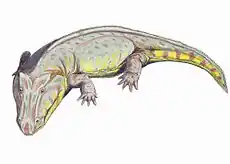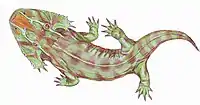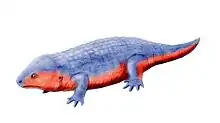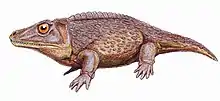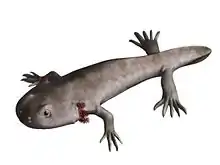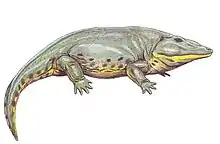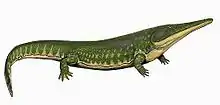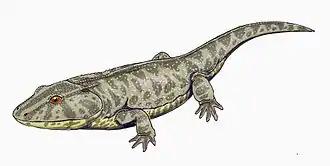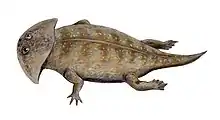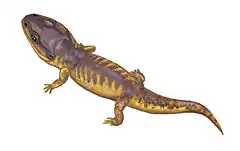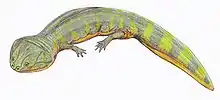Metoposauridae
Metoposauridae is an extinct family of trematosaurian temnospondyls. The family is known from the Triassic period. Most members are large, approximately 1.5 metres (4.9 ft) long and could reach 3 m long.[1] Metoposaurids can be distinguished from the very similar mastodonsauroids by the position of their eyes, placed far forward on the snout.
| Metoposaurids | |
|---|---|
 | |
| Metoposaurus | |
| Scientific classification | |
| Kingdom: | Animalia |
| Phylum: | Chordata |
| Order: | †Temnospondyli |
| Suborder: | †Stereospondyli |
| Superfamily: | †Metoposauroidea |
| Family: | †Metoposauridae Watson, 1919 |
| Genera | |
Taphonomy
Several mass accumulations of metoposaurid fossils are known from the southwestern United States and Morocco. These have often been interpreted as the result of mass deaths from droughts. Many individuals would have died in one area, creating a dense bone bed once fossilized. These mass accumulations of metoposaurids are often dominated by one taxa, such as Anaschisma or Metoposaurus.[2] Recent sedimentological studies suggest that the mass accumulations were not the result of droughts, but of river currents carrying remains. Most skeletons in these accumulations are disarticulated, suggesting they were transported by water to the deposition sites. The large gatherings of metoposaurids may have been breeding sites, and were probably common across floodplains in Late Triassic Pangaea.[3]
References
- Brusatte, S. L., Butler R. J., Mateus O., & Steyer S. J. (2015). A new species of Metoposaurus from the Late Triassic of Portugal and comments on the systematics and biogeography of metoposaurid temnospondyls. Journal of Vertebrate Paleontology. e912988., 2015:
- Murry, P.A. (1987). "Notes on the stratigraphy and paleontology of the Upper Triassic Dockum Group". Journal of the Arizona-Nevada Academy of Science. 22 (1): 73–84.
- Lucas, S.G.; Rinehart, L.F.; Krainer, K.; Spielmann, J.A.; Heckert, A.B. (2010). "Taphonomy of the Lamy amphibian quarry: A Late Triassic bonebed in New Mexico, U.S.A." (PDF). Palaeogeography, Palaeoclimatology, Palaeoecology. 298 (4): 388–398. doi:10.1016/j.palaeo.2010.10.025.
